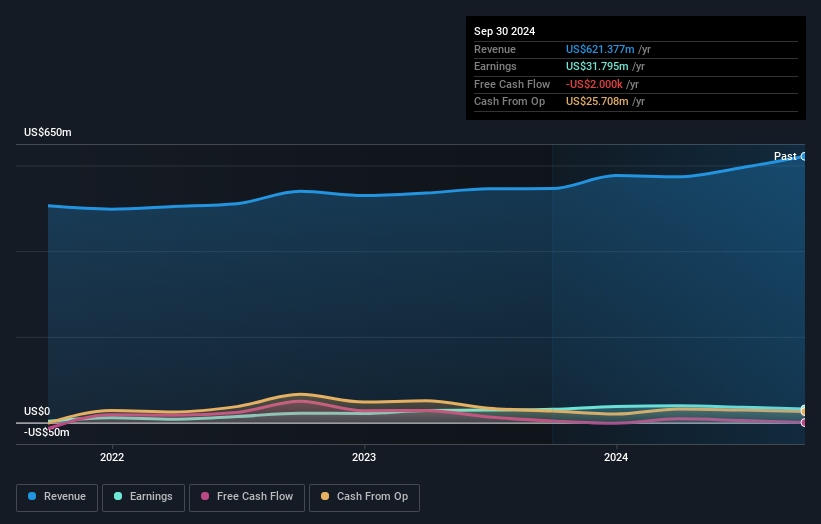- United States
- /
- Auto Components
- /
- NasdaqCM:CAAS
After the recent decline, China Automotive Systems, Inc. (NASDAQ:CAAS) Top Key Executive Hanlin Chen's holdings have lost 12% of their value

Key Insights
- Significant insider control over China Automotive Systems implies vested interests in company growth
- Hanlin Chen owns 52% of the company
- Past performance of a company along with ownership data serve to give a strong idea about prospects for a business
A look at the shareholders of China Automotive Systems, Inc. (NASDAQ:CAAS) can tell us which group is most powerful. The group holding the most number of shares in the company, around 65% to be precise, is individual insiders. Put another way, the group faces the maximum upside potential (or downside risk).
As market cap fell to US$126m last week, insiders would have faced the highest losses than any other shareholder groups of the company.
In the chart below, we zoom in on the different ownership groups of China Automotive Systems.
See our latest analysis for China Automotive Systems

What Does The Institutional Ownership Tell Us About China Automotive Systems?
Institutional investors commonly compare their own returns to the returns of a commonly followed index. So they generally do consider buying larger companies that are included in the relevant benchmark index.
Since institutions own only a small portion of China Automotive Systems, many may not have spent much time considering the stock. But it's clear that some have; and they liked it enough to buy in. If the business gets stronger from here, we could see a situation where more institutions are keen to buy. It is not uncommon to see a big share price rise if multiple institutional investors are trying to buy into a stock at the same time. So check out the historic earnings trajectory, below, but keep in mind it's the future that counts most.

We note that hedge funds don't have a meaningful investment in China Automotive Systems. Because actions speak louder than words, we consider it a good sign when insiders own a significant stake in a company. In China Automotive Systems' case, its Top Key Executive, Hanlin Chen, is the largest shareholder, holding 52% of shares outstanding. Meanwhile, the second and third largest shareholders, hold 5.1% and 5.0%, of the shares outstanding, respectively. Interestingly, the second-largest shareholder, Qizhou Wu is also Chief Executive Officer, again, pointing towards strong insider ownership amongst the company's top shareholders.
While studying institutional ownership for a company can add value to your research, it is also a good practice to research analyst recommendations to get a deeper understand of a stock's expected performance. As far as we can tell there isn't analyst coverage of the company, so it is probably flying under the radar.
Insider Ownership Of China Automotive Systems
While the precise definition of an insider can be subjective, almost everyone considers board members to be insiders. The company management answer to the board and the latter should represent the interests of shareholders. Notably, sometimes top-level managers are on the board themselves.
Most consider insider ownership a positive because it can indicate the board is well aligned with other shareholders. However, on some occasions too much power is concentrated within this group.
It seems that insiders own more than half the China Automotive Systems, Inc. stock. This gives them a lot of power. Given it has a market cap of US$126m, that means they have US$82m worth of shares. Most would argue this is a positive, showing strong alignment with shareholders. You can click here to see if those insiders have been buying or selling.
General Public Ownership
The general public, who are usually individual investors, hold a 31% stake in China Automotive Systems. This size of ownership, while considerable, may not be enough to change company policy if the decision is not in sync with other large shareholders.
Next Steps:
It's always worth thinking about the different groups who own shares in a company. But to understand China Automotive Systems better, we need to consider many other factors.
I like to dive deeper into how a company has performed in the past. You can find historic revenue and earnings in this detailed graph.
Of course this may not be the best stock to buy. Therefore, you may wish to see our free collection of interesting prospects boasting favorable financials.
NB: Figures in this article are calculated using data from the last twelve months, which refer to the 12-month period ending on the last date of the month the financial statement is dated. This may not be consistent with full year annual report figures.
New: AI Stock Screener & Alerts
Our new AI Stock Screener scans the market every day to uncover opportunities.
• Dividend Powerhouses (3%+ Yield)
• Undervalued Small Caps with Insider Buying
• High growth Tech and AI Companies
Or build your own from over 50 metrics.
Have feedback on this article? Concerned about the content? Get in touch with us directly. Alternatively, email editorial-team (at) simplywallst.com.
This article by Simply Wall St is general in nature. We provide commentary based on historical data and analyst forecasts only using an unbiased methodology and our articles are not intended to be financial advice. It does not constitute a recommendation to buy or sell any stock, and does not take account of your objectives, or your financial situation. We aim to bring you long-term focused analysis driven by fundamental data. Note that our analysis may not factor in the latest price-sensitive company announcements or qualitative material. Simply Wall St has no position in any stocks mentioned.
About NasdaqCM:CAAS
China Automotive Systems
Through its subsidiaries, manufactures and sells automotive systems and components in the People’s Republic of China, the United States, and internationally.
Excellent balance sheet and slightly overvalued.
Similar Companies
Market Insights
Community Narratives



